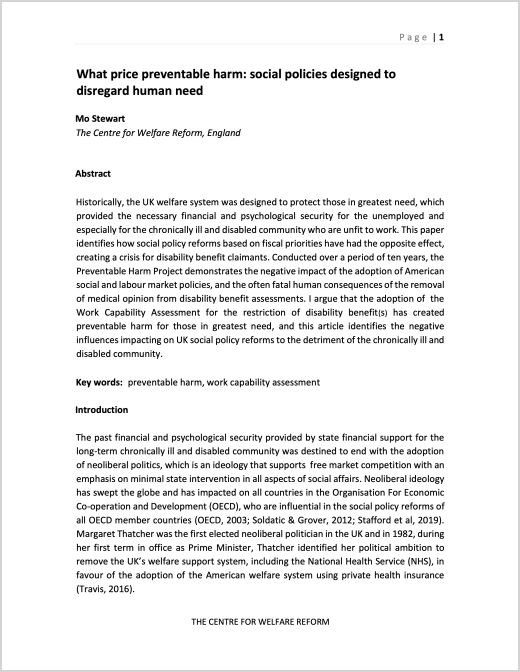Mo Stewart summarises the conclusions of the Preventable Harm Project which examined the causes and impact of the flawed WCA.
Author: Mo Stewart
Following ten years of research for her critically acclaimed Preventable Harm Project, Mo Stewart has spent the past year promoting the often disturbing findings of her research.
A healthcare professional by training, not an academic, Mo’s research exposed the influence of corporate America with UK social policy reforms, and the creation of social policies which were destined to cause preventable harm to the chronically ill and disabled community who are unfit to work. The reforms introduced the fatally flawed work capability assessment, which disregards clinical opinion and was adopted to limit access to out-of-work disability benefits with often catastrophic human consequences.
From the Abstract:
Historically, the UK welfare system was designed to protect those in greatest need, which provided the necessary financial and psychological security for the unemployed and especially for the chronically ill and disabled community who are unfit to work. This paper identifies how social policy reforms based on fiscal priorities have had the opposite effect, creating a crisis for disability benefit claimants. Conducted over a period of ten years, the Preventable Harm Project demonstrates the negative impact of the adoption of American social and labour market policies, and the often fatal human consequences of the removal of medical opinion from disability benefit assessments. I argue that the adoption of the Work Capability Assessment for the restriction of disability benefit(s) has created preventable harm for those in greatest need, and this article identifies the negative influences impacting on UK social policy reforms to the detriment of the chronically ill and disabled community.
Read and download the free pdf in your browser, link below.

The publisher is the Centre for Welfare Reform.
What Price Preventable Harm: social policies designed to disregard human need © Mo Stewart 2020.
All Rights Reserved. No part of this paper may be reproduced in any form without permission from the publisher except for the quotation of brief passages in reviews.
disability, social justice, tax and benefits, England, Paper